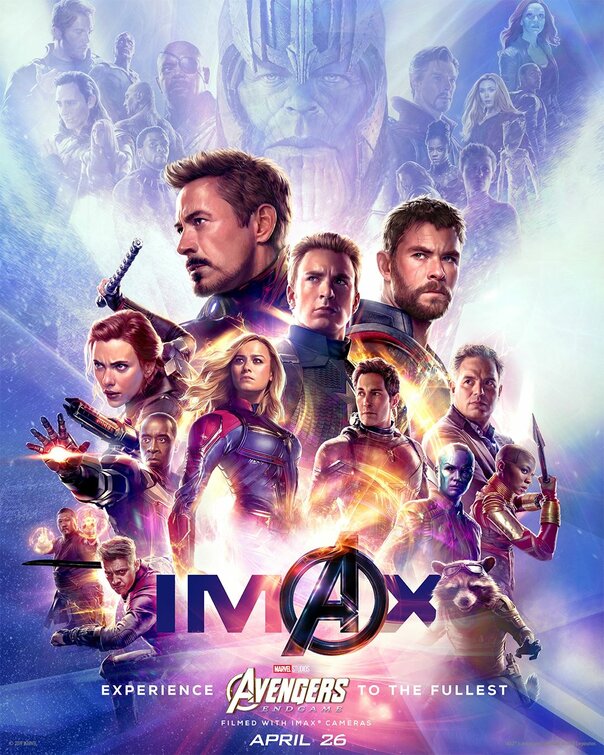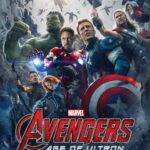Directors
Anthony Russo
Joe Russo
Starring
Chris Evans
Robert Downey Jr
Chris Hemsworth
Scarlett Johansson
Mark Ruffalo
Jeremy Renner
Josh Brolin
**I would have thought this obvious but literally everything about this review is a spoiler and as such, this review is primarily for those who have already seen the movie**
After the events of Avengers: Infinity War, Tony Stark [Downey Jr] and Nebula [Karen Gillen] are adrift in space but rescued by Captain Marvel [Brie Larson] and brought back to Earth. There, the surviving Avengers locate a signal on a distant planet and discover that Thanos is alone, having used the infinity stones again to destroy the infinity stones. With their plan to simply reverse the effect of the gauntlet ruined, Thor [Hemsworth], lashes out and beheads the Titan. The story then jumps ahead five years and illustrates mankind’s efforts to move on in the wake of the loss of half of all life. The Avengers are dispatched both globally and galactically to act as an unofficial police force. Through random circumstance, Scott Lang [Paul Rudd], whom everyone thought dead, is released from the quantum realm and introduces the idea that quantum physics can be deployed to navigate time and undo Thanos’ actions. Thus a grand scheme is hatched to travel back in time and recover all of the infinity stones to reverse the damage wrought upon the universe.
One of the first things that needs to be addressed is that Endgame has the unenviable task of being a second instalment. More than that, it is the follow-up to a film that got to step away from the standard formula, break the rules and leave its audience hanging in a state of uncertainty. This film had to not only course correct back to the expected but do it in a manner that felt somehow satisfying to the majority of viewers without feeling like a complete retcon. In truth, this movie could never live up to everyone’s expectations, the best it could do was deliver something simultaneously nostalgic, subversive and bombastic – which I believe it did stunningly. Having said that, that statement comes with a lot of caveats.
From the trailers alone, the notion of a time skip and time travel were somehow inevitable and despite what could be construed as a fairly slow-burn first hour, it felt like no time was wasted getting straight to these conceits. But as I said, there was an inevitability to the regressive, self-exploratory nature and a weight of legacy to this feature despite the fact that, ultimately, very little actually happens (I will contradict this exact point later but I stand by it). Oddly enough, both Avengers and Infinity War did the same thing; while achieving something hitherto unimaginable, the core narrative developments were relatively straightforward and could be broken down into a handful of key plot points. But introducing something like time travel to a universe creates a lot of headaches for a standalone tale let alone the direction of a franchise as the question will continually arise: why don’t they just use time travel to fix this new problem? On top fo that, Endgame also sets up its own rules for time travel and then seemingly breaks them – a cardinal sin of story-telling. Certain outcomes are not possible through time travel, others ostensibly are and the only overriding sense of which prevails is dictated by which is more convenient for the plot at that moment in time. Having said that, I would stand by my tried and tested adage that we don’t care that Terminator 2 can’t work because it’s so very, very entertaining and Endgame is no different.
Something that may not be apparent upon first viewing is how well Marvel have balanced character development with spectacle; despite being something they repeatedly exercise in their features. If we take Tony Stark, for example, the catalyst that drives his arc is choosing to potentially lose the peace he has found in defeat or live with the guilt of simply not trying to rectify his failings. What it is to be a hero, what it is to be a father, many of these things may be initially lost on an audience but the script is smart enough to condense it down into three or four lines that will really resonate with fans: “I love you 3000” “I am Iron Man” and “You can rest now Tony.” That’s it. His whole arc in this movie. This is what I stand to lose, this is my choice, this is my destiny. Which is a logic that can be applied to the six central Avengers and the truth is that so many of the core characters have these deeply personal moments but a few may become initially lost in the first viewing. Things like Black Widow’s [Johansson] death, for another example, may feel rushed over, solely because the narrative urgency dictates the pacing. But when we think about Natasha’s role as “the man on the wall” (as Fury once said in the comics), her attempts to bring Clint back into the fold, her sacrifice and finally her almost secondary funeral with only Barton and Wanda in attendance, it says a lot to the nature of her presence on the team as a spy who keeps everyone at arm’s length. Each of the OG members of the Avengers team transitions from individually-motivated hero to saviour, willing to make the ultimate sacrifice for the good of humanity. In other words, the film achieves wondrous things with character development and catharsis but by offering so much of it, the nuance is lost, like eating spoonfuls of assorted herbs and spices without a main dish – sure I can kind of taste them all but it’s frankly overwhelming and difficult to appreciate.
If we put the old guard to one side for a second, we end up with the Captain Marvel problem. Carol Danvers is extremely overpowered and is absent for almost the entire film. Sure, it’s explained fairly, highlighting that the Earth isn’t the centre of the universe but she was not only massively under-utilised but also a bit devoid of the personality cultivated in her standalone feature (but I think this is probably down to the filming schedule – I wouldn’t be surprised if her scenes here were shot before anything on Captain Marvel). By devoting such a substantial amount of time to the original core group (as a milestone and a send off), new blood are left a little neglected and curiously, a little obsolete. I understand there will be plenty of time to explore them in greater detail in the coming years and the next 20+ Marvel films but this lack of screen time afforded to individual components felt like an imbalance.
It’s also worth noting that Endgame is a brilliant technical achievement. The amount of exciting and competent visual effects is staggering and the level of production design and recreation involved in revisiting old sets during the time travel sequences is impressive. I still feel one of the standout accomplishments is the level of emotion, physicality and weight of presence behind the motion capture of Josh Brolin as Thanos. Interestingly, with so many periods and settings visited, Alan Silvestri is given quite a lot to play with. He works in the major character themes and instrumentation as well as the dour funereal tones we experienced in Infinity War but also gives us a taste of some levity with the jazz-infused heist music, especially when breaking into the SHIELD facility in 1970. But for every soaring motif, there is a slew of admittedly generic ambient tones that fit the visuals but are far from memorable, averaging out to a functional but fairly uninspired score.
Incidentally, as a rather odd comparison, YouTube board game enthusiasts, Shut Up And Sit Down, reviewed one of the largest, most expansive and indulgent board games (Twilight Imperium: Fourth Edition) by stating for all of its merits and all their love of it, it is incredibly stupid. That’s how I feel about Endgame. I am, at this point, a devotee to the MCU; I’m here for release-day screenings and the next decade of stories. I think the whole franchise is a wonder and even when it is misfiring, it’s performing spectacularly. Its interconnectivity and episodic nature is as much a pro as it is a con, the possibilities are vast and the accomplishments to date, undeniable. But if I take a step back from that love, I can quite happily admit that this 22 part saga is a bloated, calculable mound of fatuity and pretension. Yet this is, first and foremost, a celebration; a cavalcade of fan-service. It is as emotional as you are invested. If you are fairly indifferent, you’re not going to suddenly care any more now but if you have an ounce of dedication or investment in this sprawling story or its legion cast, you can’t help but get sucked into the mad glory of its soap opera tropes. The three hours passes reasonably and then we enter into a bit of a Return Of The King multiple endings situation that is more a passing of the torch than an all-out conclusion. Which is probably because Endgame is somehow bigger than a single narrative, it’s a chapter of a larger entity – subsequently it will leave a bitter taste in some viewer’s mouths but the actualisation of the feat remains. It didn’t do what everyone wanted but it did what it was supposed to. It drew a line and allowed this steamrolling behemoth to rest on its laurels for just a moment and proudly announce, “Like it or not, we have done the impossible. And we will do it again. And again.”
Release Date:
25th April 2019
The Scene To Look Out For:
During the colossal final showdown between Thanos’ vast army and Earth’s finest, there is a moment when an ensemble of female heroes mount an all-out assault. It makes no sense in a sense of battle logistics but who honestly gives a shit? My wife felt this was a bit forced but it’s about time images like this are forced onto our screen. The fact that the audience could tell the film was making a point to gather its female combatants into a single melee is testament to its importance, specifically we shouldn’t notice, it should be the norm by now and we’re still far from it. And if this is the direction Marvel is taking blockbusters, more power to them. As a second highlighted scene, during the credits time is given to the key players of the entire franchise and there is a genuine rising in one’s chest as Endgame pulls a Star Trek: VI – The Undiscovered Country with the actors silhouettes and signatures acknowledging the significance this cast and these movies have had on the industry.
Notable Characters:
The evolution of Thor from dour to pure comedic relief has been an interesting one. When looking back on Thor’s best moments, people tend to highlight the fish-out-of-water mirth or giddy irreverence, yet the shift in personality was one of the main complaints made about Thor: Ragnarok. I feel the representation of Thor will be a very divisive one here too but for a plethora of reasons. In Iron Man 3, Stark is racked with PTSD at the prospect of his own insignificance and the mounting intergalactic forces that could threaten the Earth. It’s given a very serious treatment and shines a light on mental health. It also appears briefly again when Stark returns to Earth and has genuine difficulty coping with his brushes with death and the monumental inability to prevent the worst from happening. When travelling back to the events of Thor: The Dark World (with some shoe-horned leftover Natalie Portman footage) Thor experiences the same thing and sinks into denial, depression and insecurity but the difference is, it’s played for comedy. Something about it didn’t feel entirely right, especially as the last meaningful interaction between Rocket and Thor was in Infinity War with Thor putting on a brave face and Hemsworth giving a surprisingly impressive and emotive performance. As stated, Thor may be one of the more divisive components, with some loving the performance and others hating it but the fact he’s (probably) being tied into a future Guardians Of The Galaxy release is a work of pure genius.
Highlighted Quote:
“It’s time travel.. either all of it is a joke or none of it is”
In A Few Words:
“A magnificent abundance of movie that stumbles only under the weight of its own excess”
Total Score: 4/5
![The Red Right Hand Movie Reviews [Matthew Stogdon]](https://reviews.theredrighthand.co.uk/wp-content/uploads/2021/12/cropped-header1.png)




